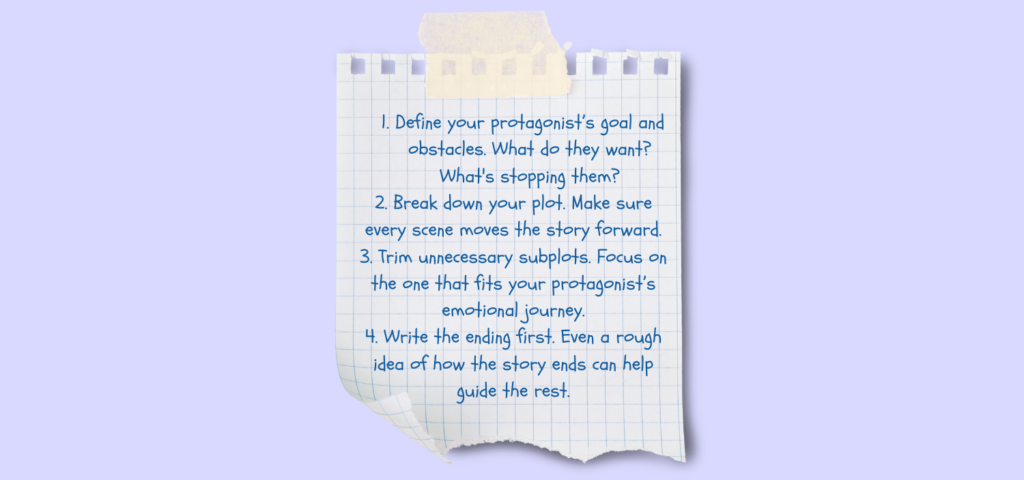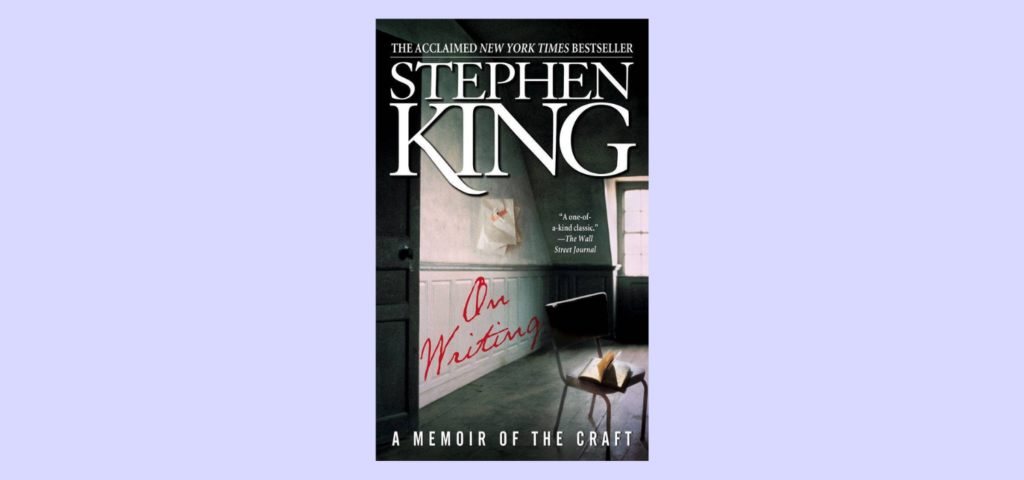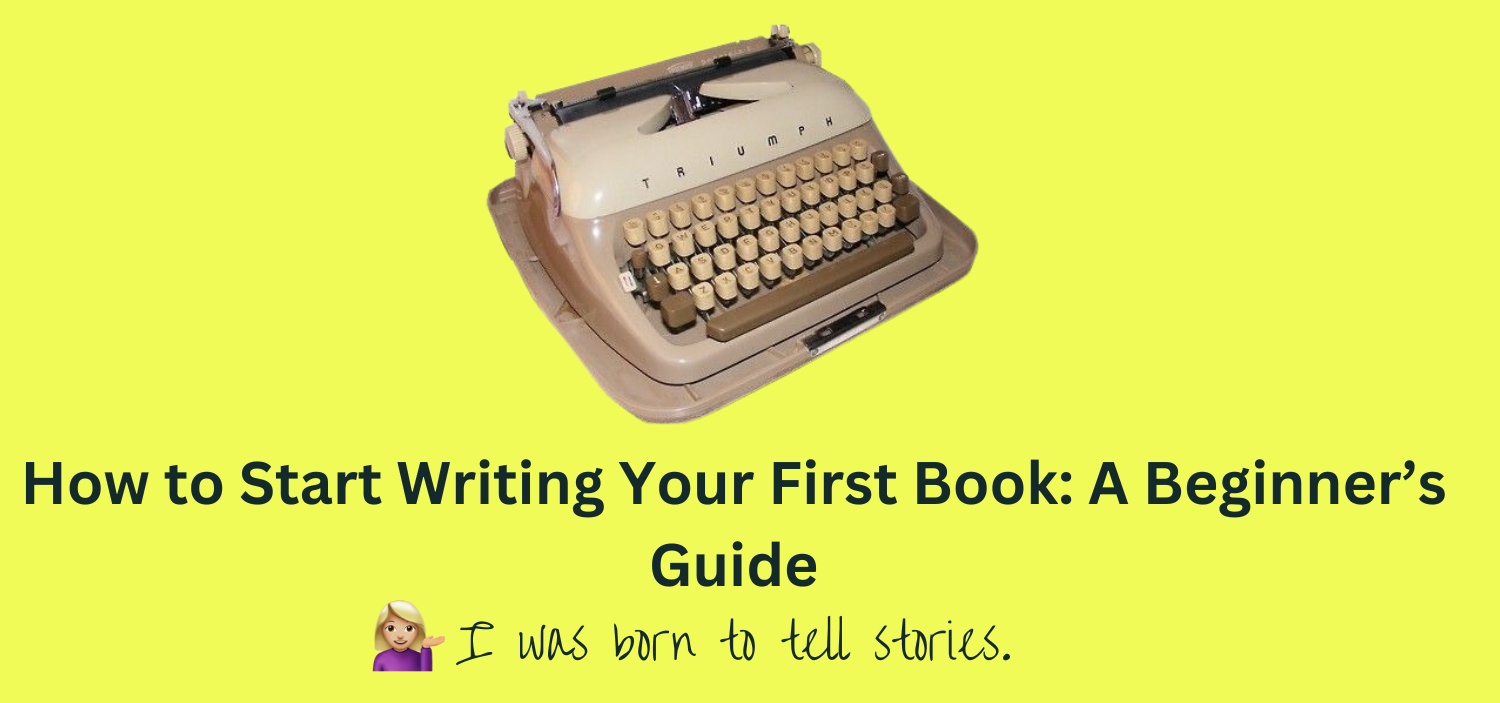Starting your first book can feel like a huge mountain to climb, especially if you’ve never written before! But trust me, I get it — it’s totally normal to feel overwhelmed at first. I’ve been there too, staring at that blank page wondering how to even begin. Well, don’t worry! 😉
In this blog, I’ll walk you through simple steps to help you start writing your book with confidence.
We’ll talk about how to break through that fear, find your creative flow, and turn your ideas into words.
Your Roadmap:
- A Bitter Truth
- Create Heroes, Not Just Characters: The Secret Sauce
- How to Find Your Writing Genre and Style When You’ve Never Written Before
- How to Add Spark to Your Plot and Keep Readers Hooked
- Stuck in Your Plot? How to Break Through Creative Blocks and Find Your Way
- Feeling Like Your Story Isn’t Unique? Here’s How to Embrace Your Own Voice
- Stephen King’s Advice for Aspiring Writers
- So, If You’re a Beginner, Start Your Journey with This
A Bitter Truth
What does it feel like to face a blank page? For a first-time writer, it’s terrifying, daunting, and often paralyzing. The endless possibilities can feel like a burden rather than a gift. The fear of failure, the doubt, the pressure to write something meaningful — it’s overwhelming. But even seasoned authors who have written 100 bestsellers still face the same challenge every time they start a new project. So, what do they do?
They take a deep breath, silence their inner critic, and start.
“The world had to wait for me to find my voice, but I did. I had to start, and then I had to keep going.” J.K. Rowling
Because the truth is, every writer, no matter how experienced, has to face that blank page at some point.

Experienced authors start by having a clear purpose — understanding why they write. It’s not just about writing a book, but about knowing what they want to achieve.
After that, they create a basic structure — a plan that includes the key moments of the story. This helps keep them focused and prevents them from getting lost, even when the ideas seem chaotic.
The next step is creating the perfect space to work. Writers know the importance of atmosphere, so they choose a place where they can stay focused and free from distractions. After that, they simply start writing.

The first draft doesn’t need to be perfect; it’s just the beginning, and it’s important not to get stuck in self-criticism. Step by step, they build the habit of writing daily, even if it’s only a few pages. And of course, after writing, they move on to editing, making every detail even better.
Create Heroes, Not Just Characters: The Secret Sauce
Creating a great hero starts with understanding their depth and motivation. Every hero has a goal, whether it’s internal (overcoming fear) or external (saving the world).
Knowing what drives your character makes them believable and relatable. Giving them flaws is crucial because perfect characters don’t exist. Flaws make them human and connect them to the reader. It could be a fear, a lack of confidence, or even a physical imperfection.
Adding inner conflict is another way to add depth. A hero who struggles with their beliefs or actions feels more complex and real. Every character should have something unique, whether it’s a way of speaking, a hobby, or how they react to stress. The diversity of traits makes them memorable and distinct.
How to Find Your Writing Genre and Style When You’ve Never Written Before
Start by writing what excites you. Don’t worry about genre—just write scenes, descriptions, or dialogues from your imagination. Write for 10–15 minutes a day without worrying about structure or style. Once you have a few pieces, step back and read them.
Do you feel more drawn to writing about real-world issues, or do you get lost in fantasy worlds?
Are you more comfortable writing about relationships, adventure, or mystery?
From there, look for patterns in your themes or characters. If your writing tends to focus on emotional struggles, maybe you’re leaning toward drama or literary fiction. If you enjoy building worlds and magic, fantasy might be your calling. Once you spot a pattern, dive deeper into that genre. Write short stories or scenes that fit that style, and focus on refining how you express emotions, actions, or ideas in your chosen genre.
“The best way to find out what you really want to do is to try doing it. Write what you care about, what excites you, what makes your heart race.” Neil Gaiman
Through this process, your natural style will evolve—whether it’s witty, poetic, minimalist, or detailed. Let your writing grow organically and embrace your voice as it comes.
How to Add Spark to Your Plot and Keep Readers Hooked
To add that “spark” to your plot, introduce unexpected twists and high-stakes moments early on. Keep the tension building with characters who face difficult choices or moral dilemmas.
Show their vulnerabilities, but also create moments where they rise above their weaknesses. Throw in conflict that challenges their beliefs, and make the stakes personal—not just global or abstract. Use pacing to your advantage—speed things up in action scenes, then slow down to build emotional depth.

Make sure your characters’ goals are clear and urgent, with obstacles that seem insurmountable but not unrealistic. Drop hints and foreshadowing to tease readers while keeping the full picture hidden. Let your characters surprise both themselves and the reader with decisions that seem out of character at first but make sense as the story progresses. Keep the conflict evolving, not just between characters, but with the world around them.
Finally, don’t be afraid to let things get messy—sometimes chaos can ignite the most interesting sparks in a plot.
Stuck in Your Plot? How to Break Through Creative Blocks and Find Your Way
When you’re stuck in a complex plot, it’s important to take a step back and simplify.
Start by writing down the core of your story—what is the main goal of your protagonist and what’s standing in their way? Break down your plot into key scenes and ask yourself: Does each scene push the story forward? If not, it might be time to remove or adjust it.
If you’re tangled in too many subplots, choose one that aligns most with the emotional arc of your protagonist. Sometimes, trimming the excess can bring clarity. Another technique is to write the ending first. Even if it’s just a rough draft, having a sense of how the story concludes can help guide the remaining events.

Creative crises often happen when you’re too focused on making everything perfect or trying to fit everything into place. Allow yourself the freedom to write messily and embrace the discovery process. Take a break, try writing from a new character’s perspective, or even switch to a completely different part of the story to shift your mindset.
Remember, even the most intricate plots need breathing room. Sometimes, focusing on the emotional journey rather than the logistics can reveal the simplest way out of your creative block.
Feeling Like Your Story Isn’t Unique? Here’s How to Embrace Your Own Voice
Comparing yourself to other writers is a natural part of the creative process, but it can quickly derail your confidence. The truth is, every story has been told in some form—but it’s the way you tell it that makes it unique. Your perspective, voice, and the way you bring your characters to life will always differentiate your story from others.

Instead of focusing on how your plot might seem similar to someone else’s, shift your attention to what makes your characters and themes stand out. What personal experiences or emotions are you pouring into the story? What are the unique dynamics between your characters? Focus on the specific details that make your world feel real and personal to you.
Remember, even the most familiar stories can feel fresh when told with authenticity and passion. There’s a reason your perspective is yours—embrace it. Instead of worrying about originality, focus on making the story the best version of your vision. That’s where the true uniqueness lies.
Stephen King’s Advice for Aspiring Writers
Stephen King, one of the most successful and influential writers of our time, has offered invaluable advice for aspiring authors. In his book On Writing: A Memoir of the Craft, King shares both personal insights and practical tips. One of his key pieces of advice is to write every day, regardless of how much you write.

He believes that writing regularly helps you develop a consistent habit and keeps you in the creative flow. King suggests setting a goal of writing at least 1,000 words per day—this is his personal routine that he follows religiously.
Another crucial tip is to read as much as you can. King believes that reading is the foundation for good writing. He encourages writers to read a variety of genres and authors, saying, “If you don’t have time to read, you don’t have the time (or the tools) to write.” He also advises writers to take notes while reading, paying attention to what works and what doesn’t in the books they consume. By doing this, writers can learn what makes great writing and apply those lessons to their own work.
When it comes to writing itself, King recommends that new authors don’t be afraid to edit ruthlessly. He talks about his own process of revising, often cutting out large portions of the original draft. King also suggests getting rid of unnecessary words and over-complicated sentences. His advice: “The adverb is not your friend,” emphasizing simplicity and clarity in writing. He believes that writing should be direct and efficient.
King also strongly emphasizes the importance of writing from the heart. He explains that you must write what you care about and that authenticity is key. “The first draft of a book—any book—is a down draft,” he writes. “You just get it down. Then you get it right.” King suggests that your first draft is only about getting your ideas down, and it’s only through editing that you can shape the story into something great.
In his book, King also touches on the importance of keeping a strong work ethic, remaining focused, and being prepared to face rejection. “If you want to be a writer, you’ve got to take rejection in stride,” he writes. The key, he says, is to not let failure define you. Instead, take it as a learning experience and keep going.
So, If You’re a Beginner, Start Your Journey with This
If you’re just starting your writing journey, take Stephen King’s advice to heart. 🫀
Write every day, even if it’s just a few hundred words—consistency is key. Read as much as you can, across different genres, to understand what works and what doesn’t. Don’t be afraid to write that messy first draft; get your ideas down and then refine them through editing. Focus on authenticity, both in your characters and your storytelling.
Finally, be prepared to face rejection, but don’t let it stop you—keep learning, improving, and believing in your potential. With dedication and patience, you’ll grow as a writer and develop your unique voice.

